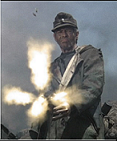Capt. Harlock
Posts: 5358
Joined: 9/15/2001
From: Los Angeles
Status: offline

|
HEAD-QUARTERS DEPARTMENT OF VIRGINIA FORTRESS MONROE, July 30, 1861.
Hon. Simon Cameron, Secretary of War:
SIR: By an order received on the morning of the 26th of July, from Major-Gen. DIX, by a telegraphic order from Lieut.-Gen. SCOTT, I was commanded to forward, of the troops of this Department, four regiments and a half, including Col. BAKER's California Regiment, to Washington, via Baltimore. . . Up to and at the time of the order I had been preparing for an advance movement, by which I hoped to cripple the resources of the enemy at Yorktown, and especially by seizing a large quantity of negroes, who were being pressed into their service in building the intrenchments there. I had five days previously been enabled to mount, for the first time, the first company of Light Artillery, which I had been empowered to raise, and they had but a single rifled cannon, an iron 6-pounder. Of course, everything must, and did yield to the supposed exigency and the orders. This ordering away the troops from this department, while it weakened the posts at Newport's News, necessitated the withdrawal of the troops from Hampton, where I was then throwing up intrenched works, to enable me to hold the town with a small force, while I advanced up the York or James River. In the village of Hampton there were a large number of negroes, composed, in a great measure, of women and children of the men who had fled thither within my lines for protection, who had escaped from maurauding parties of rebels who had been gathering up able-bodied blacks to aid them in constructing their batteries on the James and York Rivers. I had employed the men in Hampton in tin owing up intrenchments, and they were working zealously and efficiently at that duty, saving our soldiers from that labor, under the gleam of the mid-day sun. The women were earning substantially their own subsistance in washing, marketing, and taking care of the clothes of the soldiers, and rations were being served out to the men who worked for the support of the children. But by the evacuation of Hampton, rendered necessary by the withdrawal of troops, leaving me scarcely 5,000 men outside the Fort, including the force at Newport's News, all these black people were obliged to break up their homes at Hampton, fleeing across the creek within my lines for protection and support. Indeed it was a most distressing sight to see these poor creatures, who had trusted to the protection of the arms of the United States, and who aided the troops of the United States in their enterprise, to be thus obliged to flee from their homes, and the homes of their masters, who had deserted them, and become not fugitives from fear of the return of the rebel soldiery, who had threatened to shoot the men who had wrought for us, and to carry off the women who had served us to a worse than Egyptian bondage. I have therefore now within the Peninsula, this side of Hampton Creek, 900 negroes, 300 of whom are able-bodied men, 30 of whom are men substantially past hard labor, 175 women, 225 children under the age of 10 years, and 170 between 10 and 18 years, and many more coming in. The questions which this state of facts present are very embarrassing.
First -- What shall be done with them? and, Second, What is their state and condition?
Upon these questions I desire the instructions of the Department. . .
. . .I should have no doubt on this question, had I not seen it stated that an order had been issued by Gen. MCDOWELL, in his department, substantially forbidding all fugitive slaves from coming within his lines or being harbored there. Is that order to be enforced in all Military Departments? If so, who are to be considered fugitive slaves? Is a slave to be considered fugitive whose master runs away and leaves him? Is it forbidden to the troops to aid or harbor within their lines the negro children who are found therein, or is the soldier, when his march has destroyed their means of subsistence, to allow them to starve because he has driven off the rebel master? Now, shall the commander of regiment or battalion sit in judgment upon the question, whether any given black man has fled from his master, or his master fled from him? Indeed, how are the free born to be distinguished? Is one any more or less a fugitive slave because he has labored on the rebel intrenchments? If he has so labored, if I understand it, he is to be harbored. . .
I have very decided opinions upon the subject of this order. It does not become me to criticise it, and I write in no spirit of criticism, but simply to explain the full difficulties that surround the enforcing it. If the enforcement of that order becomes the policy of the Government, I, as a soldier, shall be bound to enforce it steadfastly, if not cheerfully. But if left to my own discretion, as you may have gathered from my reasoning, I should take a widely different course from that which it indicates.
In a loyal State I would put down a servile insurrection. In a state of rebellion I would confiscate that which was used to oppose my arms, and take all that property, which constituted the wealth of that State, and furnished the means by which the war is prosecuted, beside being the cause of the war; and if, in so doing, it should be objected that human beings were brought to the free enjoyment of life, liberty and the pursuit of happiness, such objections might not require much consideration.
Pardon me for addressing the Secretary of War directly upon this question, as it involves some political considerations, as well as propriety of military action. I am Sir, your obedient servant,
BENJ. F. BUTLER.
The full text of Butler's letter is available at:
http://www.nytimes.com/1861/08/06/news/slave-question-letter-major-gen-butler-treatment-fugitive-slaves.html?pagewanted=1

 Attachment (1) Attachment (1)
_____________________________
Civil war? What does that mean? Is there any foreign war? Isn't every war fought between men, between brothers?
--Victor Hugo
|
 Printable Version
Printable Version


















 New Messages
New Messages No New Messages
No New Messages Hot Topic w/ New Messages
Hot Topic w/ New Messages Hot Topic w/o New Messages
Hot Topic w/o New Messages Locked w/ New Messages
Locked w/ New Messages Locked w/o New Messages
Locked w/o New Messages Post New Thread
Post New Thread